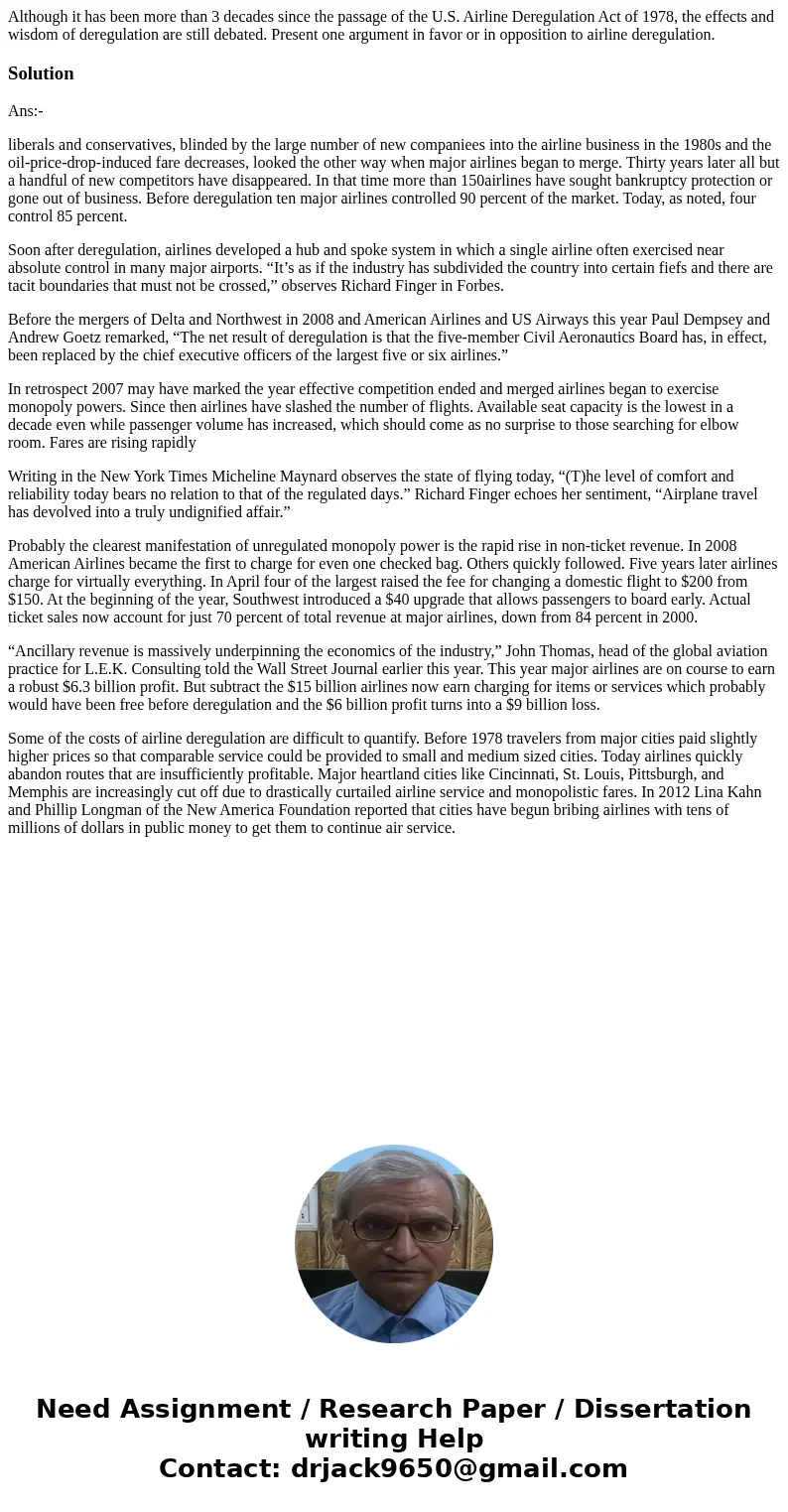Although it has been more than 3 decades since the passage o
Although it has been more than 3 decades since the passage of the U.S. Airline Deregulation Act of 1978, the effects and wisdom of deregulation are still debated. Present one argument in favor or in opposition to airline deregulation.
Solution
Ans:-
liberals and conservatives, blinded by the large number of new companiees into the airline business in the 1980s and the oil-price-drop-induced fare decreases, looked the other way when major airlines began to merge. Thirty years later all but a handful of new competitors have disappeared. In that time more than 150airlines have sought bankruptcy protection or gone out of business. Before deregulation ten major airlines controlled 90 percent of the market. Today, as noted, four control 85 percent.
Soon after deregulation, airlines developed a hub and spoke system in which a single airline often exercised near absolute control in many major airports. “It’s as if the industry has subdivided the country into certain fiefs and there are tacit boundaries that must not be crossed,” observes Richard Finger in Forbes.
Before the mergers of Delta and Northwest in 2008 and American Airlines and US Airways this year Paul Dempsey and Andrew Goetz remarked, “The net result of deregulation is that the five-member Civil Aeronautics Board has, in effect, been replaced by the chief executive officers of the largest five or six airlines.”
In retrospect 2007 may have marked the year effective competition ended and merged airlines began to exercise monopoly powers. Since then airlines have slashed the number of flights. Available seat capacity is the lowest in a decade even while passenger volume has increased, which should come as no surprise to those searching for elbow room. Fares are rising rapidly
Writing in the New York Times Micheline Maynard observes the state of flying today, “(T)he level of comfort and reliability today bears no relation to that of the regulated days.” Richard Finger echoes her sentiment, “Airplane travel has devolved into a truly undignified affair.”
Probably the clearest manifestation of unregulated monopoly power is the rapid rise in non-ticket revenue. In 2008 American Airlines became the first to charge for even one checked bag. Others quickly followed. Five years later airlines charge for virtually everything. In April four of the largest raised the fee for changing a domestic flight to $200 from $150. At the beginning of the year, Southwest introduced a $40 upgrade that allows passengers to board early. Actual ticket sales now account for just 70 percent of total revenue at major airlines, down from 84 percent in 2000.
“Ancillary revenue is massively underpinning the economics of the industry,” John Thomas, head of the global aviation practice for L.E.K. Consulting told the Wall Street Journal earlier this year. This year major airlines are on course to earn a robust $6.3 billion profit. But subtract the $15 billion airlines now earn charging for items or services which probably would have been free before deregulation and the $6 billion profit turns into a $9 billion loss.
Some of the costs of airline deregulation are difficult to quantify. Before 1978 travelers from major cities paid slightly higher prices so that comparable service could be provided to small and medium sized cities. Today airlines quickly abandon routes that are insufficiently profitable. Major heartland cities like Cincinnati, St. Louis, Pittsburgh, and Memphis are increasingly cut off due to drastically curtailed airline service and monopolistic fares. In 2012 Lina Kahn and Phillip Longman of the New America Foundation reported that cities have begun bribing airlines with tens of millions of dollars in public money to get them to continue air service.

 Homework Sourse
Homework Sourse